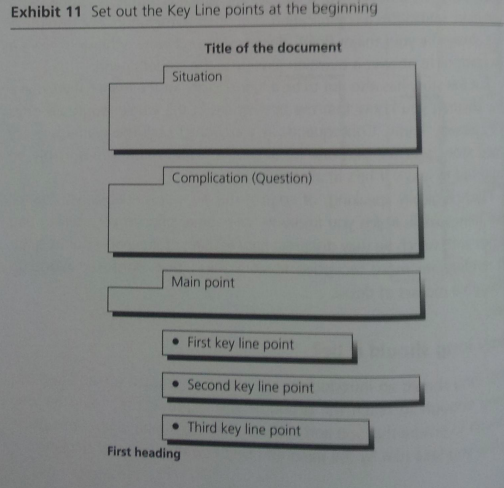Where do you start the situation?(你从哪里开始描述情境?)-金字塔原理
2024-11-14

原文: When you can readily identify the reader by name, as in a letter or memorandum, determining where to start is usually fairly straightforward. You start at the point where you can make a self-sufficient and noncontroversial statement about the subject – self-sufficient in the sense that no previous statement is needed to make the precise meaning of this one clear, and noncontroversial in the sense that you can expect him automatically to understand it and agree to it.
If you are writing a report for wide circulation, however, or a magazine article or a book, the job is not so much to remind the reader of the question as to plant one. Here getting started is a bit more difficult. Assume that your readers are moderately well informed, and present an explanation of what is already generally accepted knowledge on the subject. By arranging known material in a narrative form, and usually in a way that they haven’t thought about it before, you inspire your readers to ask the question you wish to address.
The key characteristic of all opening Situation sentences is that they leave you expectant for further information – and that is what qualifies them to be openers. Each one establishes the base for a story to come. Here are some typical Situation opening sentences:
Energovinest is considering the possibility of exporting alumina from its Mostar plant to Ziar in Czechoslovakia. (Memorandum.)
Every major health service is beset by increasing pressure on already scarce resources – and the Irish Health Service is no exception. (Report.)
If we accept the common usage of words, nothing can be more readily disproved than the old saw, ‘You can’t keep a good man down.’ (Book.)
翻译: 当你可以轻松地按名字识别读者时,比如在信件或备忘录中,确定从哪里开始通常是相对简单的。你可以从一个关于主题的自足且无争议的陈述开始——“自足”是指不需要之前的陈述就可以让这句话的确切含义清晰明了,“无争议”是指你可以期望他自动理解并同意。
然而,如果你在写一份广泛传播的报告,或是杂志文章或书籍,任务更多地不是提醒读者问题,而是引发一个问题。这里的开始会有点困难。假设你的读者知识适中,提供一个对该主题已经普遍接受的知识的解释。通过以叙述形式排列已知的材料,通常以一种他们以前未曾想过的方式,你可以激发读者提出你希望解决的问题。
所有开篇情境句的关键特征是,它们让读者期待进一步的信息——这正是使它们适合作为开篇的原因。每句话都为即将展开的故事奠定了基础。以下是一些典型的情境开头句:
Energovinest 正在考虑将氧化铝从其莫斯塔尔工厂出口到捷克斯洛伐克的 Ziar。(备忘录。)
每个主要的医疗服务都面临着对稀缺资源的不断增长的压力——爱尔兰的医疗服务也不例外。(报告。)
如果我们接受词语的常见用法,那么没有什么比老话“你无法让一个好人失望”更容易被推翻的了。(书籍。)

发表评论: